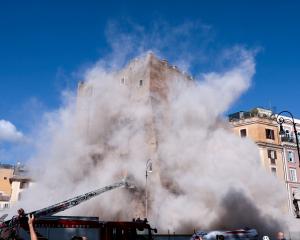The protesters had gathered outside the embassy over the killing Nimr al-Nimr on Saturday, a prominent cleric from the kingdom's Shi'ite minority, on terrorism charges that Iran said were unjustified.
The executions, which also included dozens of al Qaeda members, signalled that the Riyadh government would not tolerate attacks, whether by Sunni jihadists or minority Shi'ites.
Hundreds of Shi'ite Muslims marched through Qatif district of Saudi Arabia's Eastern Province in protest at the execution of the cleric, an eyewitness said. They chanted "down with the Al Saud", the name of the ruling Saudi royal family.
In Tehran, protesters broke into the embassy and lit fires inside before being cleared by police, the ISNA news agency reported. Images shared on social media appeared to show protesters smashing furniture inside the embassy.
Later images showed police in full riot gear guarding the premises as firefighters doused the building. ISNA said Tehran's police chief was on the scene to restore calm.
Foreign Ministry spokesman Hossein Jaber Ansari called for calm and said there should be no more demonstrations around Saudi diplomatic premises, the state news agency IRNA reported.
The United States government and the European Union are concerned the killing of al-Nimr could exacerbate sectarian tensions. The US urged all leaders in the Middle East to "redouble efforts" to de-escalate regional tensions.
"We reaffirm our calls on the Government of Saudi Arabia to respect and protect human rights, and to ensure fair and transparent judicial proceedings in all cases," John Kirby, a spokesman for the US State Department, said in a statement.
In Hawaii, where President Barack Obama is on holiday with his family, White House deputy national security adviser Ben Rhodes said the administration has urged the Saudis to show restraint regarding respect for human rights.
"We broadly I think have concerns about human rights issues in Saudi Arabia, and again we also would like to see steps taken by Saudi Arabia and other countries to reduce sectarian tensions in the region," Rhodes said.
EU foreign policy chief Federica Mogherini, reiterating the bloc's opposition to the death penalty and mass executions in particular, said Nimr's case raised serious concerns over freedom of expression and the respect of basic civil and political rights in Saudi Arabia.
"This case has also the potential of inflaming further the sectarian tensions that already bring so much damage to the entire region, with dangerous consequences," she said, urging Saudi authorities to promote reconciliation between different communities in the country.
Kirby noted that Washington has previously expressed its concern about the Saudi legal system, and raised those concerns at high levels with the Saudi government.
Biggest mass execution since 1980
Nimr, the most vocal critic of the ruling Al Saud among the Shi'ite minority, had come to be seen as a leader of the sect's younger activists, who rejected the quiet approach of older community leaders for failing to achieve equality with Sunnis.
Most of the 47 killed in the kingdom's biggest mass execution for decades were Sunnis convicted of al Qaeda attacks in Saudi Arabia a decade ago. Four, including Nimr, were Shi'ites accused of involvement in shooting policemen.
The executions took place in 12 cities in Saudi Arabia, four prisons using firing squads and the others beheading. In December, al Qaeda in the Arabian Peninsula threatened to retaliate against Saudi Arabia for any execution of its members.
In Iraq, prominent religious and political figures called for a severing of ties, calling into question fence-mending efforts by Riyadh that could help boost a regional alliance against Islamic State militants.
However, the executions seemed mostly aimed at discouraging Saudis from jihadism after bombings and shootings by Sunni militants in Saudi Arabia over the past year killed dozens and Islamic State called on followers there to stage attacks.
Islamic State called on Saturday on supporters to attack Saudi soldiers and police in revenge for the executions of militants, in a message on Telegram Channel, a prominent vehicle for the group's backers, the SITE monitoring group reported.
Saudi Arabia's ruling Al Saud family has grown increasingly nervous in recent years as Middle East turmoil, especially in Syria and Iraq, has empowered Sunni militants seeking to bring it down and given room to Shi'ite Iran to spread its influence.
The simultaneous execution of 47 people - 45 Saudis, one Egyptian and a man from Chad - was the biggest mass execution for security offences in Saudi Arabia since the 1980 killing of 63 jihadist rebels who seized Mecca's Grand Mosque in 1979.
The 43 Sunni jihadists executed on Saturday, including several prominent al Qaeda leaders and ideologues, were convicted for attacks on Western compounds, government buildings and diplomatic missions that killed hundreds from 2003-06.
The four Shi'ites were convicted of involvement in shootings and petrol bomb attacks that killed several police during anti-government protests from 2011-13 in which over 20 members of the minority sect were also shot dead by the authorities.
Under Saudi Arabia's reading of Islamic Sharia law, such attacks are interpreted as "banditry", carrying an automatic sentence of death followed by public display of bodies on gibbets.
Grand Mufti Abdulaziz Al al-Sheikh, the kingdom's top religious authority, praised the executions as "just".












